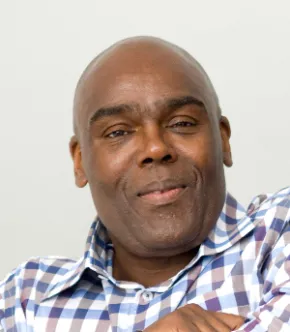To mark the launch of the book, Life Beyond Crime: What do those at risk of offending, prisoners and ex-offenders need to learn? We have conducted a series of Q&As.

Paul Brown Chief Executive of The Y (Leicester YMCA) with over 25 years’ experience of community-based work specifically with disadvantaged young people/adults. He has a wealth of experience in social housing, education, health, governance, charity and property law. He is also a former member of Leicestershire Police Authority where he headed up complaints, stop and search and BME issues.
Paul has been a serving Magistrate for 15 years and is former Vice Chair of South Leicestershire and North Warwickshire and Hinckley College. The Y is a Christian charity sports, arts, community centre, theatre and social housing provider, open to all regardless of age, gender, ability or religious faith.
In your extensive experience in community based work with young people and young adults, what has been the most inspirational work you saw/were involved in?
The most inspirational work I have been involved in is working with a group of disadvantaged young men in inner city Birmingham, using drama as a medium to look at issues such as relationships, sex, violence, drugs and masculinity. This group of hard to engage young men went from the edge of gang culture to creating a professional film (Safe) where they shared issues of being young men growing up in a multicultural society, reflecting all the pressures they had to cope with as part of their masculinity.
What is the one thing you wish the young people and young adults who use The Y knew about the support and help you provide before they come to you?
That we are far more than just a housing service and we offer a holistic approach that recognise their needs and works with them to address these needs. Additionally, that we will support young people to engage in positive activities to help them transform their lives and build a platform for their future independence.
What is the one thing you hope that the young people and young adults who use The Y will have learnt by the time they finish their time with your service?
The one thing I hope that the young people and young adults who use our services have learnt while they are with us is that they have the skills to understand their personal journeys, that they are equipped to live independently and they have the knowledge, skills and awareness to understand risky behaviour or associations and the consequences of their actions.
What is the most important lesson you have learnt from working with disadvantaged young adults and young people at risk of or directly involved in the criminal justice system?
That crime is sometimes the only way that young people can identify that will significantly change their lives for the better. There is little or no understanding that the risk of involvement in crime could change their lives in a negative way. Often young people feel that they have no choice as engagement in crime, balanced against the need to function within their peer groups, is a risk worth taking. If we don’t understand that, we will never be able to work with them successfully.
Complete this sentence. If there was one thing I could do to make the world a better place for young people and young adults at risk or involved in the criminal justice system, it would be…
Raising awareness that in the long-term, crime does not pay, and there are other ways to achieve your goals.
Life Beyond Crime
Life Beyond Crime brings together in an insightful and passionate debate, through prose, poems and pictures the assembled first-hand experience and wisdom of more than 60 contributors responding to the question What do those at risk of offending, prisoners and ex-offenders need to learn? Contributors include current and former prisoners including the work of artists and poets who have been recognised by Koestler awards; criminal justice practitioners; educators and academics; as well writers from the voluntary and arts worlds including theatre director Phyllida Lloyd, lyricist Sir Richard Stilgoe and sculptor Sir Antony Gormley. Learning and understanding are discussed in their widest sense, covering not just formal learning and learning skills, but also – and most importantly – learning about yourself, your past and future identity, your family life and your aspirations and role in society. These types of understanding are explored in the contexts of diversion from crime, young people, adults in prison, and returning to the community.
You can buy the book online from the Koestler Trust